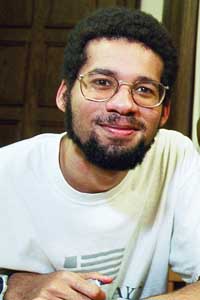Recent graduate Onyisi receives Apker Award for physics research
By Josh SchonwaldNews Office
 Peter Onyisi |
A June graduate of the College, Peter Onyisi is the winner of the American Physical Society’s 2004 Leroy Apker Award for undergraduate physics achievement from a Ph.D.-granting institution. Onyisi received it for his paper, “Looking for New Invisible Particles.”
Onyisi’s prize-winning paper is an outgrowth of his involvement in the Collider Detector at Fermilab project and his work with Henry Frisch, Professor in Physics, the Enrico Fermi Institute and the College.
According to Frisch, the award-winning research involved searching for photons that emerge out of collisions created by the world’s largest subatomic super-collider. Millions of collisions occur every second, but the question Onyisi addressed, Frisch said, is “whether anything unexpected ever occurs? He looked for photons moving very violently sideways from the proton and anti-proton collisions. This is predicted to occur at a very low rate in the Standard Model of the fundamental forces and particles. If we see photons coming out on one side at a rate larger than predicted, and nothing to balance that on the other side, then something new has occurred. That something new could be either supersymmetry or possibly energy escaping into extra space dimensions.” Ultimately, Frisch said, Onyisi did not find either supersymmetry or new space dimensions, but he was able to set a significant limit on both.
And Onyisi’s paper, which chronicles this search, Frisch said, “is a very important paper and beautiful research.” So esteemed was the research that not only did it win the Apker award, but also was published last fall in Physical Review Letters, a top physics journal. Onyisi, then a fourth-year, wrote the paper co-authored by 500 other researchers.
Frisch, who has taught at Chicago for more than 30 years, said that among the numerous students he has worked with over the years, many of whom have gone on to become distinguished scientists, Onyisi stands out. “He has the ability to learn extremely quickly, but it’s in how he applies that knowledge in creative ways that distinguishes him,” said Frisch.
In a group of 700 physicists working on the Collider Detector at Fermilab project, Frisch said, “If I had to pick a handful to begin a project, no matter how small that handful is, I would include Peter.”
Onyisi, who grew up in Nigeria before attending Phillips Exeter for high school, said he always knew he would pursue a career in physics. In fact, he said, “Even before high school, I was interested in cosmology and particle physics.” While he did not choose Chicago solely because of its proximity and relationship to Fermilab, Onyisi said the opportunity to do advanced scientific research as an undergraduate student was certainly a factor.
Aware of Onyisi’s excellence in science—he was a member of the U.S. team in the International Science Olympiad that placed No. 10 in 1999—Frisch recruited Onyisi for the Collider Detector at Fermilab team while Onyisi was just a first-year.
The phrasing of Frisch’s note—“Would you be interested in searching for supersymmetry”—intrigued Onyisi. “I had only vaguely heard of supersymmetry,” he said. “But I knew it was neat stuff.” When given the opportunity to work on the forefront of high-energy physics, Onyisi said, “I, of course, jumped at the opportunity.”
In joining the project, Onyisi became part of a group of 700 researchers around the world studying subatomic particles. Some researchers look for new particles, while others study particular quarks or forces. An important part of the project, though, run by Frisch at Chicago since the mid-1980s, searches for new subatomic particles. Ultimately, Onyisi was given the chance to lead a project that Carla Grosso-Pilcher, Senior Scientist in the Enrico Fermi Institute, had initiated in 1998, and David Fernie, an undergraduate, continued in 1999.
Onyisi worked 12 to 15 hours a week on the project. A big challenge, he said, was learning to measure and quantify cosmic rays. His devotion to the project was evident—he became the project’s expert on its legacy software and gave talks at Fermilab, and still has time to be an active member of the University’s College Bowl team, of which he served as president. A two-year Scavenger Hunt veteran, Onyisi also is a student of Polish. “That is also what’s extraordinary about Peter,” said Frisch, “he can get more physics work done than anyone else around and still do extracurricular activities, seemingly without much stress.”
At Cornell University, where he currently is a Ph.D. student, Onyisi plans to continue his research in high-energy experimental physics. While he is unsure of his ultimate course, he is increasingly interested in designing super-colliders, like Fermilab.
![[Chronicle]](/images/sidebar_header_oct06.gif)